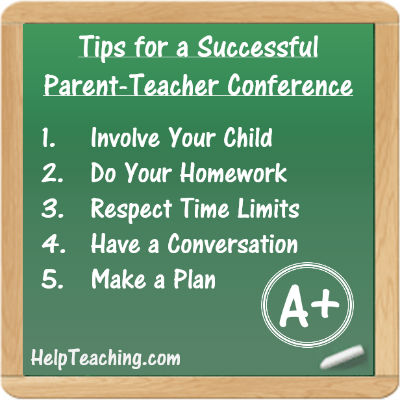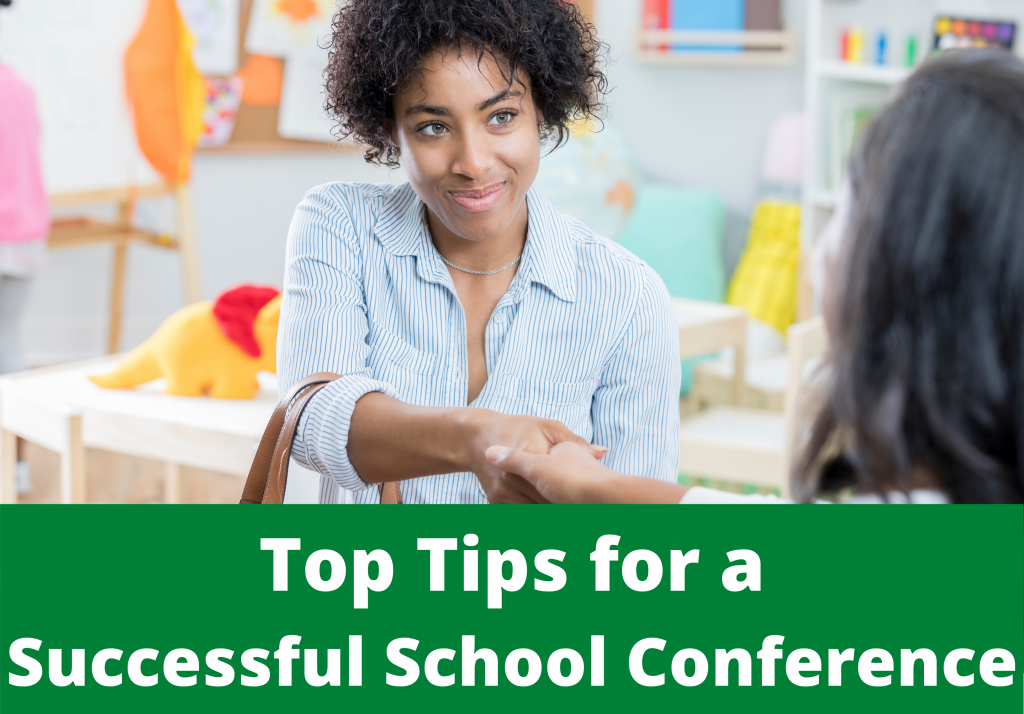Top Parent Tips for a Successful School Conference
- 1 August, 2021 //
- For Parents //
- Tags : parent resources
- Comments Off on Top Parent Tips for a Successful School Conference
Parent-teacher conferences can make parents, students, and even veteran teachers feel like they under the microscope and being scrutenized. As parents, we want our children to be successful and happy, and to give them the opportunities and resources to thrive. As a result, we love to hear about their accomplishments and it can be a hard pill to swallow when there’s feedback on areas that need improvement. Developing a strong partnership with your child’s teachers is critical to ensuring academic progress. At the same time, it’s important to strike the balance and not be a helicopter parent. Below, we offer you tips for entering your next parent-teacher conference prepared, with an open mind, and ready to collaborate so that you leave with a positive outcome. Let’s dive in!
What is a Parent-Teacher Conference?
If your little one is new to school, you’ll also be new to parent-teacher conferences. A parent-teacher conference is, as the name suggests, a meeting between parents and teachers related to a child’s education. They’re typically held twice a year and can be up to 30 minutes in length. Some schools, however, only hold parent-teacher conferences when there is a specific issue that needs to be discussed.
For a typical parent-teacher conference, the theme is all about learning. This can include the process of learning, any learning difficulties, or factors affecting learning such as social and behaviroral development.
Ways you can prepare in advance include the “What”, “When”, and “Why”. Find out what the meeting is about (not all parent-teacher conferences are about being in trouble!), ensure there are no scheduling conflicts – this is especially important if you work fulltime, or are divorced, etc., and whether it’s a meeting to discuss your child’s overall performance or a particular issue is being discussed. Having these three things in the bag will help lower any anxieties through preparedness and help keep your child from picking on on your emotions.
Preparation for a Parent-Teacher Conference
Arguably one of the most important things you can do to prepare for a parent-teacher conference is to involve your child. While the meeting is between adults, it’s important to include your child. This can be done by going over schoolwork with your child. You’ll be able to establish how they’re performing, whether they need help, or are excelling and perhaps need more challenging work to prevent boredom.
Talk with your child to learn how they feel about school. Asking questions about their friends, teachers (liked and disliked), subjects, and activities is a good start. Then, ask more reflective questions, like if there’s anything they would want to talk to their teacher about, does anyone at the school bully them or make them feel bad, and so on. Reassure your child if they show any feelings of apprehension about the meeting that you’re all working as a team for their success, and feed their curiosity by letting them know you’ll share what was discussed, and strategies for improvement.
You can then prepare a list of questions that you’d like to talk to the teacher about. You may feel that you’ll remember all the questions in your head, but it’s easy to forget something while in conversation.
What Kinds of Questions to Ask at a Parent-Teacher Conference
When you’ve chatted to your child an looked through their work, your list of questions can include things like this:
- Is my child performing at grade level?
- Is my child making sufficient academic progress?
- Where does my child sit?
- How is my child’s individualized education plan (IEP) being followed?
- Do you have any concerns about my child’s social-emotional development?
- How much time should my child spend on homework?
- What can I do at home to better support my child’s learning?
- Does my child show strong interest in any topic or subject?
- Is there anything I should share with next year’s teacher?
Don’t forget to add things you’d like to share about your child with her teacher. This can include any family difficulties such as a death, sickness, or relationship struggles, or passions such as a particular sport, musical instrument, or genre/titles of books. These will help the teacher connect with the student. If you have information from the previous year’s teacher on strategies that helped your child succeed in class, those will also be useful to talk about.
Time Limits at Parent-Teacher Conferences
As mentioned earlier, parent-teacher conferences can range between 10 minutes and 30 minutes. In your preparation stage, you would have learned how long the meeting will be and what it is about. It’s really important to respect the time limits for both the teacher and for other parents. To do this, you can arrive early or on time, be mindful of time passing during your conversation, and end the meeting when the time is up. You can always schedule a follow-up meeting with the teacher if necessary.
When you arrive early for your meeting, you can use the extra minutes to go over your prepared questions. If you haven’t done so yet, it’s a good opportunity to identify the most important questions so you can get to those first without worrying about time running out. Chances are that the teacher will have an agenda and keep the conversation moving forward. They may even address the questions you have before you even need to ask them!
When you reach the end of your time, leave things on a positive note and exit the room. Doing so allows the teacher to make her own notes about the conference, prepare for the next meeting, and keeps things running on schedule.
Have a Conversation
First and foremost, a parent-teacher conference is a conversation not a confrontation. It’s important to be calm and to be yourself as you and the teacher have a common goal – your child’s progress and success. In this way, you can view the meeting as a collaborative session between teammates. Like any productive conversat ion, a good conference should involve both participants listening and speaking. The teacher will most likely lead the flow of the conversation. Listen actively to what the teacher says. Take notes that you can refer to later and record actions items that you need to follow through on after the conference ends. Ask questions and share information about your child where they naturally fit in the conversation. And if you don’t understand something, don’t be afraid to ask for an explanation. Towards the end of the conference, read through the notes you prepared ahead of time and bring up any items that were not mentioned. You can also chat about more ways you can help your child at home. And don’t forgot to discuss anything your child asked you to share with her teacher!
ion, a good conference should involve both participants listening and speaking. The teacher will most likely lead the flow of the conversation. Listen actively to what the teacher says. Take notes that you can refer to later and record actions items that you need to follow through on after the conference ends. Ask questions and share information about your child where they naturally fit in the conversation. And if you don’t understand something, don’t be afraid to ask for an explanation. Towards the end of the conference, read through the notes you prepared ahead of time and bring up any items that were not mentioned. You can also chat about more ways you can help your child at home. And don’t forgot to discuss anything your child asked you to share with her teacher!
The Next Steps After a Meeting
The final couple minutes of the conference should be spent developing an action plan for how you and the teacher will best support your child going forward. This may include scheduling a follow-up meeting to further discuss anything that came up during the conference which couldn’t be fully covered in the allotted time. Review the things that you and the teacher will do to support your child as well as any expectations that need to be communicated with your child. Make sure you know the best method of contacting the teacher and determine a timeframe for when you will next check-in on your child’s progress.
Family engagement is vital to student success. Your parent-teacher conference attendance shows your child that you care about them and what goes on at school, as well as opens a dialog with the teacher. Share your tips on how to have a successful conference in the comments.
If you enjoyed this article, read 7 Tips for Learning with Kids. HelpTeaching.com also offers free, printable study skills worksheets to help promote effective learning strategies.



